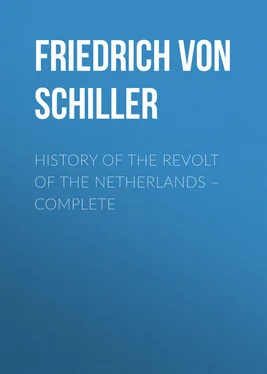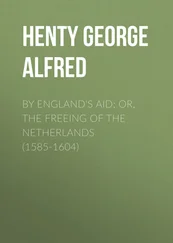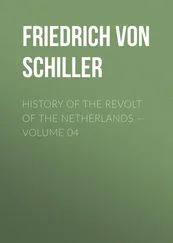Friedrich Schiller - History of the Revolt of the Netherlands – Complete
Здесь есть возможность читать онлайн «Friedrich Schiller - History of the Revolt of the Netherlands – Complete» — ознакомительный отрывок электронной книги совершенно бесплатно, а после прочтения отрывка купить полную версию. В некоторых случаях можно слушать аудио, скачать через торрент в формате fb2 и присутствует краткое содержание. Жанр: История, literature_18, foreign_antique, foreign_prose, на английском языке. Описание произведения, (предисловие) а так же отзывы посетителей доступны на портале библиотеки ЛибКат.
- Название:History of the Revolt of the Netherlands – Complete
- Автор:
- Жанр:
- Год:неизвестен
- ISBN:нет данных
- Рейтинг книги:3 / 5. Голосов: 1
-
Избранное:Добавить в избранное
- Отзывы:
-
Ваша оценка:
- 60
- 1
- 2
- 3
- 4
- 5
History of the Revolt of the Netherlands – Complete: краткое содержание, описание и аннотация
Предлагаем к чтению аннотацию, описание, краткое содержание или предисловие (зависит от того, что написал сам автор книги «History of the Revolt of the Netherlands – Complete»). Если вы не нашли необходимую информацию о книге — напишите в комментариях, мы постараемся отыскать её.
History of the Revolt of the Netherlands – Complete — читать онлайн ознакомительный отрывок
Ниже представлен текст книги, разбитый по страницам. Система сохранения места последней прочитанной страницы, позволяет с удобством читать онлайн бесплатно книгу «History of the Revolt of the Netherlands – Complete», без необходимости каждый раз заново искать на чём Вы остановились. Поставьте закладку, и сможете в любой момент перейти на страницу, на которой закончили чтение.
Интервал:
Закладка:
Philip’s adverse destiny decreed that all the treasures which he lavished for the oppression of the Provinces should contribute to enrich them. The continual outlay of Spanish gold had diffused riches and luxury throughout Europe; but the increasing wants of Europe were supplied chiefly by the Netherlanders, who were masters of the commerce of the known world, and who by their dealings fixed the price of all merchandise. Even during the war Philip could not prohibit his own subjects from trading with the republic; nay, he could not even desire it. He himself furnished the rebels with the means of defraying the expenses of their own defence; for the very war which was to ruin them increased the sale of their goods. The enormous suns expended on his fleets and armies flowed for the most part into the exchequer of the republic, which was more or less connected with the commercial places of Flanders and Brabant. Whatever Philip attempted against the rebels operated indirectly to their advantage.
The sluggish progress of this war did the king as much injury as it benefited the rebels. His army was composed for the most part of the remains of those victorious troops which had gathered their laurels under Charles V. Old and long services entitled them to repose; many of them, whom the war had enriched, impatiently longed for their homes, where they might end in ease a life of hardship. Their former zeal, their heroic spirit, and their discipline relaxed in the same proportion as they thought they had fully satisfied their honor and their duty, and as they began to reap at last the reward of so many battles. Besides, the troops which had been accustomed by their irresistible impetuosity to vanquish all opponents were necessarily wearied out by a war which was carried on not so much against men as against the elements; which exercised their patience more than it gratified their love of glory; and where there was less of danger than of difficulty and want to contend with. Neither personal courage nor long military experience was of avail in a country whose peculiar features gave the most dastardly the advantage. Lastly, a single discomfiture on foreign ground did them more injury than any victories gained over an enemy at home could profit them. With the rebels the case was exactly the reverse. In so protracted a war, in which no decisive battle took place, the weaker party must naturally learn at last the art of defence from the stronger; slight defeats accustomed him to danger; slight victories animated his confidence.
At the beginning of the war the republican army scarcely dared to show itself in the field; the long continuance of the struggle practised and hardened it. As the royal armies grew wearied of victory, the confidence of the rebels rose with their improved discipline and experience. At last, at the end of half a century, master and pupil separated, unsubdued, and equal in the fight.
Again, throughout the war the rebels acted with more concord and unanimity than the royalists. Before the former had lost their first leader the government of the Netherlands had passed through as many as five hands. The Duchess of Parma’s indecision soon imparted itself to the cabinet of Madrid, which in a short time tried in succession almost every system of policy. Duke Alva’s inflexible sternness, the mildness of his successor Requescens, Don John of Austria’s insidious cunning, and the active and imperious mind of the Prince of Parma gave as many opposite directions to the war, while the plan of rebellion remained the same in a single head, who, as he saw it clearly, pursued it with vigor. The king’s greatest misfortune was that right principles of action generally missed the right moment of application. In the commencement of the troubles, when the advantage was as yet clearly on the king’s side, when prompt resolution and manly firmness might have crushed the rebellion in the cradle, the reigns of government were allowed to hang loose in the hands of a woman. After the outbreak had come to an open revolt, and when the strength of the factious and the power of the king stood more equally balanced, and when a skilful flexible prudence could alone have averted the impending civil war, the government devolved on a man who was eminently deficient in this necessary qualification. So watchful an observer as William the Silent failed not to improve every advantage which the faulty policy of his adversary presented, and with quiet silent industry he slowly but surely pushed on the great enterprise to its accomplishment.
But why did not Philip II. himself appear in the Netherlands? Why did he prefer to employ every other means, however improbable, rather than make trial of the only remedy which could insure success? To curb the overgrown power and insolence of the nobility there was no expedient more natural than the presence of their master. Before royalty itself all secondary dignities must necessarily have sunk in the shade, all other splendor be dimmed. Instead of the truth being left to flow slowly and obscurely through impure channels to the distant throne, so that procrastinated measures of redress gave time to ripen ebullitions of the moment into acts of deliberation, his own penetrating glance would at once have been able to separate truth from error; and cold policy alone, not to speak of his humanity, would have saved the land a million citizens. The nearer to their source the more weighty would his edicts have been; the thicker they fell on their objects the weaker and the more dispirited would have become the efforts of the rebels. It costs infinitely more to do an evil to an enemy in his presence than in his absence. At first the rebellion appeared to tremble at its own name, and long sheltered itself under the ingenious pretext of defending the cause of its sovereign against the arbitrary assumptions of his own viceroy. Philip’s appearance in Brussels would have put an end at once to this juggling. In that case, the rebels would have been compelled to act up to their pretence, or to cast aside the mask, and so, by appearing in their true shape, condemn themselves. And what a relief for the Netherlands if the king’s presence had only spared them those evils which were inflicted upon them without his knowledge, and contrary to his will. 1 1 More modern historians, with access to the records of the Spanish Inquisition and the private communications between Phillip II. and his various appointees to power in the Netherlands, rebut Shiller’s kind but naive thought. To the contrary, Phillip II. was most critical of his envoys lack of severity. See in particular the “Rise of the Dutch Republic” and the other works of John Motley on the history of the Netherlands all of which are available at Project Gutenberg. – D.W.
What gain, too, even if it had only enabled him to watch over the expenditure of the vast sums which, illegally raised on the plea of meeting the exigencies of the war, disappeared in the plundering hands of his deputies.
What the latter were compelled to extort by the unnatural expedient of terror, the nation would have been disposed to grant to the sovereign majesty. That which made his ministers detested would have rendered the monarch feared; for the abuse of hereditary power is less painfully oppressive than the abuse of delegated authority. His presence would have saved his exchequer thousands had he been nothing more than an economical despot; and even had he been less, the awe of his person would have preserved a territory which was lost through hatred and contempt for his instruments.
In the same manner, as the oppression of the people of the Netherlands excited the sympathy of all who valued their own rights, it might have been expected that their disobedience and defection would have been a call to all princes to maintain their own prerogatives in the case of their neighbors. But jealousy of Spain got the better of political sympathies, and the first powers of Europe arranged themselves more or less openly on the side of freedom.
Читать дальшеИнтервал:
Закладка:
Похожие книги на «History of the Revolt of the Netherlands – Complete»
Представляем Вашему вниманию похожие книги на «History of the Revolt of the Netherlands – Complete» списком для выбора. Мы отобрали схожую по названию и смыслу литературу в надежде предоставить читателям больше вариантов отыскать новые, интересные, ещё непрочитанные произведения.
Обсуждение, отзывы о книге «History of the Revolt of the Netherlands – Complete» и просто собственные мнения читателей. Оставьте ваши комментарии, напишите, что Вы думаете о произведении, его смысле или главных героях. Укажите что конкретно понравилось, а что нет, и почему Вы так считаете.












